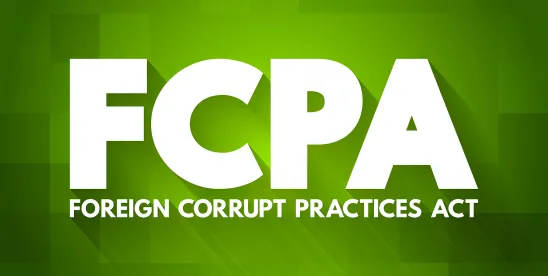The U.S. Department of Justice (DOJ) issued new guidelines on June 9, 2025, limiting the investigation and prosecution of potential Foreign Corrupt Practices Act (FCPA) violations to instances in which U.S. economic and security interests are at risk. This means companies should:
- Ensure compliance departments remain vigilant.
- Adjust FCPA compliance programming and training as needed.
- Reassess compliance risks and programming to reflect the DOJ’s new priorities.
The new guidelines address the current administration’s complaint that FCPA enforcement has historically placed an “undue burden” on U.S. companies operating abroad. In line with its “America First” policy approach, the administration’s new guidelines provide that, effective immediately:
- FCPA investigations and prosecutions are only to target “conduct that directly undermines U.S. national interests,” with a specific focus on matters involving individual criminal misconduct rather than “nonspecific malfeasance” by corporations.
- Only “serious misconduct” should be prioritized.
- National security considerations will drive many FCPA investigations and prosecutions, particularly that the FCPA should be deployed in furtherance of the administration’s stated objective of “eliminating” drug trafficking cartels and transnational criminal organizations.
Given these new guidelines, what should companies that operate overseas do?
Compliance Departments Should Remain Vigilant
The new guidelines make clear that FCPA investigations and prosecutions will continue, and the DOJ’s actions since January support this conclusion. Even during the “pause” in FCPA enforcement, the DOJ allowed at least seven FCPA cases or investigations to continue. However, at the same time, the DOJ appears to have closed five investigations, dismissed one action, and terminated the monitorship and reporting requirements early for at least two companies. While the number of DOJ investigations is lower, compliance departments cannot conclude that the risk of FCPA enforcement is zero.
FCPA Compliance Programming May Need Adjustments
How the FCPA will now be applied remains unclear. The DOJ’s recent track record of dismissals does not reveal a clear pattern. Cases that do not appear to implicate any U.S. business interests or transnational criminal organizations have been allowed to continue.
Also, the DOJ guidelines do not address the U.S. Securities and Exchange Commission’s (SEC) plans to continue enforcing the FCPA anti-bribery and “books and records” accounting provisions.
Companies should therefore consider tailoring their compliance programming to the specific considerations enumerated in the DOJ’s guidance and remain flexible to address changing priorities and applications of the statute in the coming months and years. For example, adjustments may include screening third parties for possible cartel connections and enhancing the focus on individual accountability.
Overall Compliance Focus May Need to Shift
The Fraud Section of the DOJ’s Criminal Division, which had exclusive jurisdiction to authorize FCPA investigations, has reportedly decreased from 32 prosecutors as of January to approximately 15 prosecutors by June. By contrast, the department seems to be elevating the role of the Money Laundering and Asset Recovery Section (MLARS) in pursuing those involved in laundering the proceeds of corrupt schemes.
And while new FCPA investigations will need to be authorized by senior personnel in the DOJ’s Criminal Division, earlier this year Attorney General Pam Bondi delegated to each U.S. Attorney the authority to pursue FCPA matters “relating to foreign bribery associated with Cartels and Transnational Criminal Organizations (TCOs).” The DOJ has emphasized other enforcement priorities — including tariff evasion and government procurement fraud — as also gaining greater emphasis.
Anti-corruption has long been a fundamental focus for compliance programs because of the existential impact of FCPA penalties. The DOJ’s current focus on individual culpability, combined with its reallocation of resources to other enforcement initiatives, may warrant companies to revisit their areas of compliance focus.
Consider Voluntary Disclosures
The statute of limitations for FCPA enforcement is five years (six years for “books and records” accounting violations). Consequently, today’s conduct may still ripen into possible prosecution by the next administration. The current administration recently announced that it will reward company disclosures by declining company prosecution, absent aggravating circumstances. Therefore, companies may wish to give consideration to voluntary disclosures for potential FCPA violations, even in circumstances where prosecution under the new guidelines appears unlikely.





 />i
/>i

